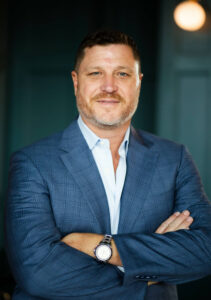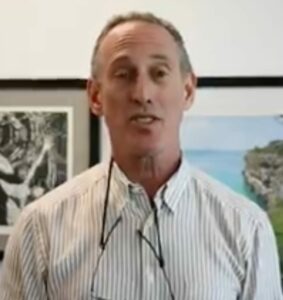On WSLR’s Peace & Justice Report, a former state senator and the Sarasota Public Defender discuss prison dysfunction.
By Johannes Werner
Original Air Date: Mar. 20, 2024
Host: Jeff Brandes served for a dozen years in the Florida legislature, including 10 years as a senator representing Pinellas County. Since his exit in 2020, the Republican has brandished the unusual image of a non-partisan problem solver. His main vehicle in this effort has become the Florida Policy Project, a non-profit he created last year to provide strategies to solve the state’s biggest problems. Brandes appeared on today’s Peace & Justice Report on WSLR, together with Sarasota Public Defender Larry Eger. Here’s a summary of their interview with host Tom Walker; we begin with how Brandes describes what is a fundamental need in Florida.

Jeff Brandes
Jeff Brandes: Everything in Tallahassee is tactical; there is no strategy. I couldn’t point to a defined strategy for dealing with the housing affordability crisis. And clearly we have no strategy on property insurance. And it’s very evident if you study any of the criminal justice issues in Florida, the prison system of Florida, that there’s no definitive strategy really on the criminal justice side or prison reform.
And so most legislators kind of leave office and walk away, and I wasn’t ready to do that. I still had some unfinished business; believed that there were some things that I really wanted to take care of that I was, you know … I’m proud of the record that I had, but there were still things I really wanted to work on and still wanted to stay engaged with. And so the Florida Policy Project was born out of that idea.
Johannes Werner: One of the major issues tackled by the Project is criminal justice reform.
JB: We’re really focused on the low hanging fruit. I remember when I realized Ron DeSantis was governor of the state of Florida. He’s unlikely to change sentencing laws, and so how do we focus on the things that probably he would be open to?
For example, reentry. Today the Florida reentry process, as you know, is 50 bucks and a bus pass. That’s not sustainable. Working on criminal justice reform is by far the hardest area of public policy to work on. Partially just to get their interest and their desire to work on this, but it’s one that largely their constituency doesn’t think about, and doesn’t want to think about. They want people to go away to prison, they don’t really care what happens in prison. We have to wake them up to what is actually happening in prison and why this affects public safety.
JW: Brandes believes education should be a major lever in improving outcomes for prisoners.
JB: And so you have, literally a thousand inmates at any one time, just sitting around doing nothing. And no resources for addiction specialists, no job training, no GED programs, those types of things, this is rampant in the Florida system, as it is in many systems in the country. But a best practice would be to provide education in the prison system, because we know that has a direct correlation to recidivism when you get out, because if you can’t get a job, what are you going to do when you get out?
JW: At one point, Public Defender Larry Eger pitched in, voicing his frustration about current incarceration practices in Sarasota.

Larry Eger
Larry Eger: Our county jail is beyond maximum capacity. So the conversation is how do we reduce the county jail population? And one of the solutions, there’s some diversion, which has minimal impact, it seems thus far, but the response of the state’s attorney’s office and law enforcement is: How do we grease the wheels so that we can move people from the county jail into state prison, so we can reduce the impact on the taxpayers of Sarasota County? But then the unintended consequences are, we’re just pushing that expense onto the state.
JW: Brandes seconded him, by pointing out that the state system is in even worse shape.
JB: And then understand that the Florida prison system is maxed out as well. We have facilities that have corrections officer vacancies of 72% in Florida. We have multiple facilities with 60% vacancies, correctional, like literally you can’t hire enough. We have 400 members of the Florida national guard currently serving, as kind of second-tier corrections officers, because we can’t hire enough staff to actively run the facilities. And if you read the KPG report, which is a kind of global consulting firm that just did a report in 2023 on the Florida prison system, they said we need to spend $2.2 billion immediately to fix plumbing issues, leaky roofs, facility issues that have been deferred for frankly decades. We’re basically, you know … the Florida prison system is basically a slum ward. I mean, it is running facilities that are barely habitable and not … 75% of the units are not air conditioned. That’s correct.
And that’s the reason you can’t hire corrections officers because, what would it take for you to work in a facility where the violence is active oftentimes, and you’re uncomfortable most of the time and you can’t bring your cell phone in, so good luck hiring a millennial because they’re not going to be without their cell phones, 12 hours a day.
And so, this is a major problem. And unfortunately, the way the Florida prison system was set up decades ago, it was set up as a rural jobs program. So if you commit a crime in Sarasota, where are you going to spend your time in prison? Well you’re so likely going to spend it in North Florida. And so, that separates people from their families. That means they’re not getting visitations, which we know has a direct correlation to success when they leave prison. But you know, if it costs you, if a family has to travel for a day, stay in a hotel, it’s going to cost them $230 a night because they’re the only hotel in town, and only visit you once every few months, most people just aren’t getting family visits anymore.
JW: Finally, both Eger and Brandes discussed ever-rising sentencing guidelines.
For the full interview on the Peace & Justice Report, go to https://www.podomatic.com/podcasts/podcast5281/episodes/2024-03-20T09_01_10-07_00
WSLR News aims to keep the local community informed with our 1/2 hour local news show, quarterly newspaper and social media feeds. The local news broadcast airs on Wednesdays and Fridays at 6pm.